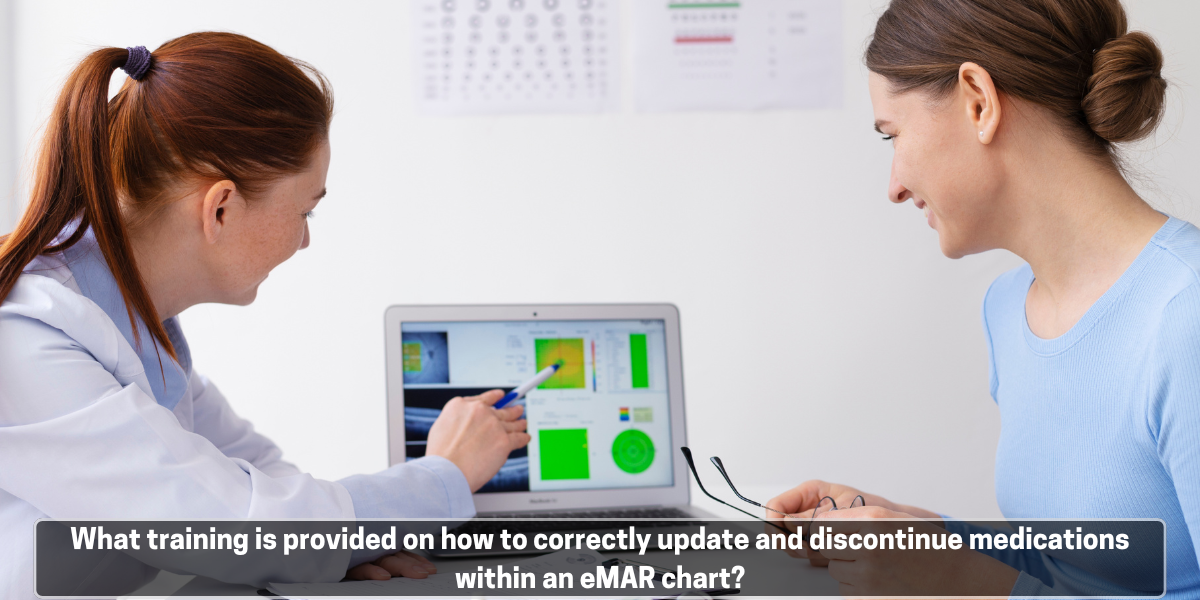Proper training on how to correctly update and discontinue medications within an electronic Medication Administration Record (eMAR) is very important for patient safety. In the UK, healthcare professionals receive clear training to use eMAR systems effectively.
- Getting familiar with eMAR
- Staff first learn how to use the basic functions of the eMAR system. These include login procedures, viewing patient records, data entry, and understanding the layout and structure of the interface.
- They become comfortable with system navigation. Staff learn to recognise common symbols and icons such as medication statuses, warnings, and reminders. This ensures quick and confident access to important information.
- Staff complete interactive modules and practical exercises. These exercises provide realistic practice in a safe environment, preparing staff for actual patient medication management.
- Updating medication records
Training explains clearly how to add new medications to the system. Staff carefully transfer medication details from prescriptions, which prevents errors that might harm patient safety.
Staff learn to carefully enter specific medication details:
- Medication name with correct spelling and form.
- Dosage with precise amounts and measurement units (mg, ml, etc.).
- Frequency clearly stating how often medication is taken, such as daily or hourly.
- Route of administration indicating how medication should be given, such as orally or intravenously.
- Special instructions such as dietary restrictions, storage instructions, patient-specific notes, or interactions with other medications.
- Staff receive training to double-check all entered details against the original prescription. This step helps prevent mistakes and ensures accuracy.
- Staff learn to confirm data entries with colleagues. This promotes teamwork, accountability, and safety when managing medications.
- Discontinuing medications safely
Staff learn the proper steps to remove medications safely from the eMAR system. This ensures medications that are no longer needed are not mistakenly administered. Staff always confirm a clear order from a doctor or prescriber before discontinuing medications. This reduces risks associated with stopping important medications prematurely or incorrectly.
Training covers the clear documentation of medication discontinuation:
- Reason for stopping the medication, to maintain clear patient medical histories.
- Date and time the medication was discontinued, for accurate clinical records.
- Name of the staff member discontinuing the medication, for accountability and traceability.
Accurate documentation ensures safe and continuous patient care, particularly during shift changes or patient transfers.
- Managing medication changes
Staff learn correct procedures for updating medication records when doses change or medications switch. Prompt updates are essential to prevent medication errors and patient harm.
Training covers common real-life scenarios:
- Patient reactions that need timely dosage adjustments to manage adverse effects.
- Clinical condition changes requiring updated medication plans.
Immediate updates in the eMAR system prevent errors and maintain effective and safe medication management.
- Handling alerts and notifications
Staff learn procedures to manage and respond effectively to alerts from the eMAR system. Prompt responses to these alerts help maintain patient safety.
Training addresses specific alerts that staff commonly encounter:
- Medication interactions that could cause harmful effects.
- Overdue medication alerts to ensure timely administration.
- Errors or discrepancies in medication records needing quick correction.
- Legal and ethical responsibilities
Staff receive clear guidance about protecting patient information in line with UK data protection laws (GDPR). Understanding their role helps staff maintain patient privacy.
Staff learn specific actions to maintain confidentiality:
- Secure login processes to prevent unauthorised access.
- Proper password management including regular updates and using complex passwords.
- Correct procedures for safe and confidential handling of patient data, preventing breaches and misuse.
Staff training is essential in healthcare facilities to maintain high-quality patient care. Care facilities should provide ongoing, comprehensive training programmes for all staff.








This blog highlights how accurate medication management and proper training are essential for patient safety in healthcare settings. Clear systems and reliable information help reduce errors and support better outcomes. For those also comparing treatment options and costs in the UK, this resource can add useful context: https://wegovypricecompare.com/price-comparison/cheapest-wegovy-1-mg-uk/